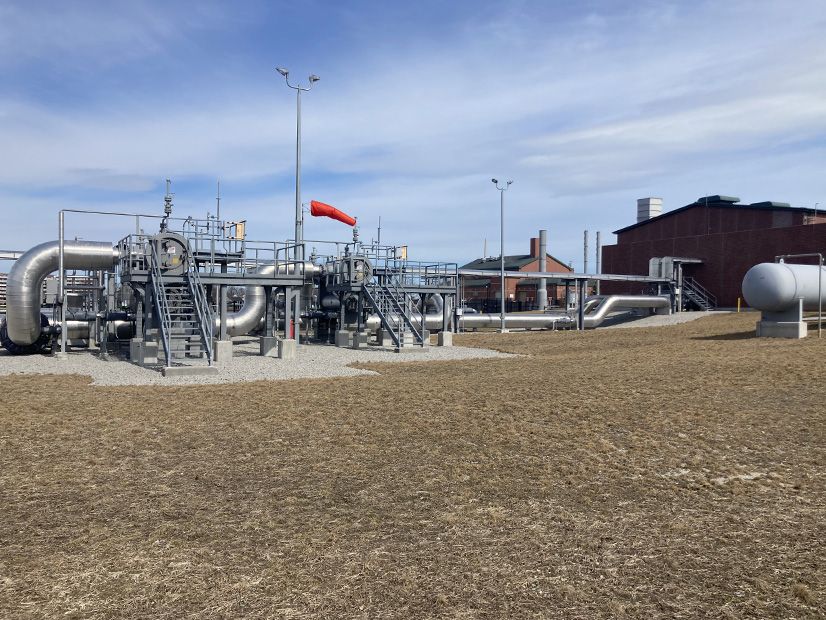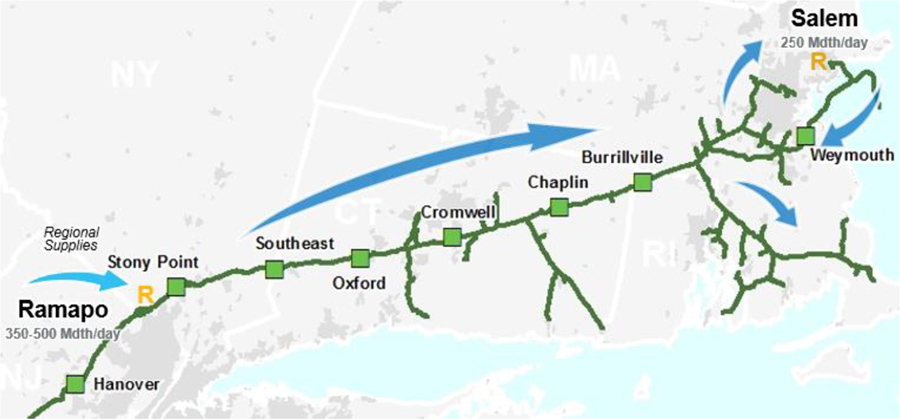Enbridge is soliciting requests for service as part of a natural gas pipeline expansion project that would significantly increase capacity to the Northeast, the company said in an open season notice issued this month.
The company said the project would expand capacity on the Algonquin gas system by up to 500,000 Dth/d at the Ramapo, N.Y., receipt point at the western end of the pipeline and 250,000 Dth/d at the Salem, Mass., receipt point at the eastern end. The total current capacity of the Algonquin system is just over 3 million Dth/d.
“Project Maple will provide much-needed supply reliability during peak daily demand, while stabilizing energy prices in the region and supporting New England’s continued journey to Net Zero,” Enbridge wrote in the open season notice.
The company said natural gas demand in New England has continued to grow, and it anticipates demand from local distribution companies increasing by 6.5% over the next five years, based on an analysis prepared for ISO-NE by ICF.
“Project scope will be comprised of a combination of replacing existing smaller diameter pipe with larger diameter pipe, extending pipeline loops in parallel to existing pipeline facilities, and adding compression at existing compressor stations, depending on subscribed volumes,” Enbridge wrote.
The open season process is a required step to demonstrate project demand to FERC. The process “seeks to identify parties desiring to obtain firm transportation service” and is open through Nov. 17. Enbridge’s target in-service date for the project is “as early as November 2029.”
“Through Project Maple, we’re seeking to increase capacity on our system to meet growing demand in the region from gas utilities, as well as for power generation,” said Max Bergeron, manager of stakeholder relations at Enbridge. “FERC has held technical conferences which have highlighted the power grid reliability concerns the region continues to face, and Project Maple is one solution which seeks to meet the need for reliable access to fuel for power generation, in addition to supporting growing demand from gas utilities.”
The proposal comes as many Northeast states are studying how to rapidly reduce the emissions resulting from the gas network and gas combustion. Natural gas primarily is made up of methane, a potent greenhouse gas, and is responsible for a large portion of the heating, electricity and industrial emissions in the region.
“Continuing the infrastructure and supply of methane is counter to our states’ climate goals; introduces hazards both from the inevitable leaks and the contributions to our enormous greenhouse gas load; and leaves rate payers, who cannot afford a clean energy transition, holding the ever-increasing bills,” said Judith Black, a climate organizer who lives in a neighboring town to Salem. “’Bad idea’ doesn’t begin to describe the Maple Project.”
In Weymouth, Mass., local community groups still are fighting to shut down a controversial Enbridge compressor station, which came online in 2021, because of climate, health and safety concerns.
“We do not anticipate adding any additional compression at the Weymouth Compressor Station as part of this project,” Bergeron said, adding the additional gas at the Salem receipt point would enter via the Maritimes & Northeast Pipeline at the western end of the system.
Alice Arena, director of , expressed dismay at the expansion plan, and called upon Massachusetts Gov. Maura Healey’s administration to block the project.
“If Maura Healey and her administration want to claim to be climate champions, this is where you stake that claim,” Arena said, adding that the proposal is incompatible with the need to rapidly reduce emissions.
“People cannot wrap their minds around where we are at in terms of climate,” Arena said. “It’s too hard to think about your children starving to death. It’s too hard to think about older people dying of the heat. It’s too hard to think about half of Boston being underwater.”
Enbridge may face a more difficult regulatory landscape than it did during the construction of the Weymouth Compressor. The state’s 2021 “Next Generation Roadmap” climate act enshrined protections for environmental justice populations into law, requiring enhanced public participation and environmental impact analyses for projects that affect state-designated environmental justice communities.
Over the past decade, Enbridge has successfully pushed through two pipeline expansion projects in the region — the Atlantic Bridge and Algonquin Incremental Market projects — but the proposed Access Northeast Project stalled because of lack of funding.
Joe LaRusso, a senior advocate at the Acadia Center, told RTO Insider the Maple Project likely will need to rely on firm contracts with the region’s local distribution companies to demonstrate demand for the project. Enbridge’s announcement noted that New England gas generators have firm contracts for only a small percentage of the gas needed to operate at full capacity, a dynamic the company called an “untenable disconnect” that raises energy prices and hurts grid reliability.
“Will the Project Maple AGTP expansion project succeed? Impossible to say,” LaRusso wrote on social media site Mastodon. “One thing IS certain: When it comes to fossil gas pipelines in New England, everything that’s old is new again.”





